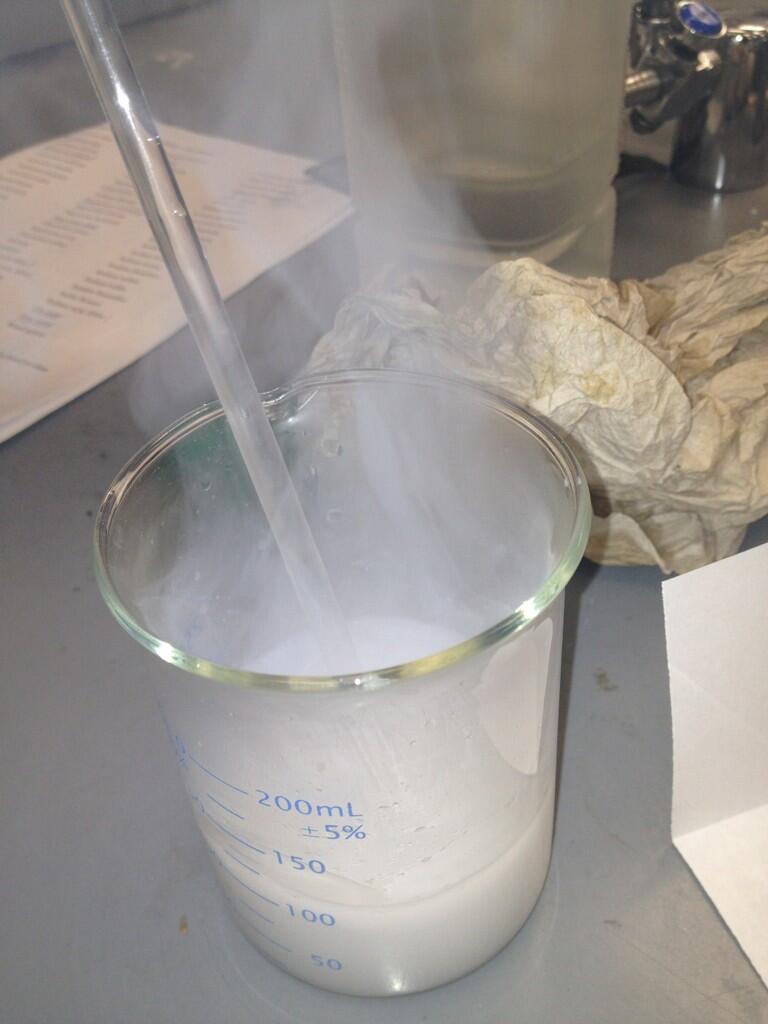Introduction:
The goal of this lab was to find the specific heat of an unknown metal to identify it. We will be collecting the weight of the samples, temperatures of the beakers of water before and after the metal sample was dropped in, as well as the temperature of the boiling water as it was not exactly 100°C since we are not at sea level.
Background:
Specific Heats-
Water = 4.184
Aluminum = 0.897
Brass and Copper = 0.385
Lead = 0.129
Stainless steel = 0.490
Zinc = 0.390
Each of these metals had a different specific heat (besides brass and copper).
1 calorie= the amount of heat needed to raise I gram of water by 1°C
Q = amount of heat energy gained or lost by substance
m = mass of sample
c = heat capacity (J°C-1 g-1 or J K-1 g-1)
Tf = final temperature
Ti = initial temperature
We use these variables in this equation to see which specific heat of the metals is most like ours.
Procedure and Materials:
1. Weigh metal samples.
2. Have 100ml water at room temperature.
3. Boil metal in water and a separate beaker.
4. Once water w/ metal reaches 100°C, remove and place in room temperature water.
5. Record temperature change in room temperature water w/ metal.
Unknown metal samples
2-250ml beakers
metal tongs
thermometer
hot plate
Data:
Weight of metal- 5.6 grams
Test #1:
100ml water before metal temp- 20.7°C
100ml water after metal temp- 21.5°C
Test #2:
100ml water before metal temp- 20.7°C
100ml water after metal temp- 21.7°C
Test #3:
100ml water before metal temp- 20.8°C
100ml water after metal temp- 21.6°C
Calculations:
Test #1:
Q = mc(ΔT)
(5.6g) x c x (99.8°- 21.5°) = 100g x (21.5 - 20.7)°C(4.184)
(5.6g) x c x 78.3 = 100g x 0.8°C(4.184)
438.48g°C x c = 334.72 Joules
438.48g°C 438.38g°C
c = 0.763 J/g°C
Test #2:
(5.6g) x c x (99.8°- 21.7°) = 100g x (21.7 - 20.7)°C(4.184)
(5.6g) x c x 78.1 = 100g x 1.0°C(4.184)
437.36g°C x c = 418.40 Joules
437.36g°C 437.36g°C
c = 0.957 J/g°C
Test #3:
(5.6g) x c x (99.8°- 21.6°) = 100g x (21.6 - 20.8)°C(4.184)
(5.6g) x c x 78.2 = 100g x 0.8°C(4.184)
437.92g°C x c = 334.72 Joules
437.92g°C 437.92g°C
c = 0.764 J/g°C
Average Specific Heat:
0.828 J/g°C
Analysis and Conclusion:
Our sample was closest to Aluminum's specific heat.
The most noteable error observed in our experiments was that we used a glass beaker instead of the foam calorimeter to measure temperature change in the water as the heated metal was dropped in. The glass beaker might have absorbed more heat than the foam calorimeter and given a lower temperature reading than it might have actually been.
Friday, May 24, 2013
Tuesday, May 7, 2013
Chemical Reaction: Calcium and Aluminum Sulfate
In our reaction between calcium and aluminum sulfate, a moderately violent reaction took place and produced a bubbling, steaming solution and a bit of heat as products.
We put the aluminum sulfate in an aqueous solution, stirring until it dissolved completely. Then we put the calcium in and the reaction started instantly. This was a single replacement reaction. The aluminum dissolved in calcium sulfate by the replacement of one metal by a more active metal.
3Ca+Al2 (SO4)3 ---> 2Al + 3Ca(SO4)
As you conduct this reaction you should see the aqueous solution start to change a murky white color. The solution should also start to make a thick white steamy cloud above the beaker. There was also heat production, the beaker was a little warm after we were done.

Subscribe to:
Comments (Atom)